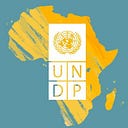Students and professionals celebrate the reopening of the public library in Dondo, Mozambique
Beira — After being dysfunctional and closed for two years, the Dondo Municipal Library has finally reopened, now featuring more resilient infrastructure, new technological equipment and durable furniture. The reopening ceremony took place on 2 July 2021, led by the president of the Municipal Council of Dondo, HE Manuel Virade Chaparica.
The library revitalization project was prepared and managed by the United Nations Development Programme (UNDP) in coordination with the Government’s Post-Cyclones Reconstruction Cabinet (GREPOC), financed by the Mozambique Recovery Facility* for a total of MZN 9.3 million (approximately US$146,000).
“After cyclone Idai, students stopped coming to the Library because the building was seriously damaged and all the material was destroyed. They were very disappointed for having lost a place to study and do consultations. I mobilized and sensitized them: education can change a child’s life and they can still have a profession,” said Arlista Sebo Inacio Bonde, a teacher for 12 years and director of the Josina Machel Dondo Primary School.
“COVID-19 brought new challenges for us to overcome. A large number of students began to stay outside the closed library, to browse the internet which was reestablished, and this helped them to continue their studies as classes were held online and many could not afford an internet connection at home. The library plays a decisive role in people’s education and cultural development. And its role can now be maximised as conditions were also created to comply with the sanitary protocol to tackle COVID-19. The revitalized garden is secured with fence walls and is a pleasant space outdoors, where people can sit together while complying with physical distancing”, concluded Bonde.
Resilience elements are now incorporated into the new and pre-existing structures to withstand future disasters, particularly through reinforced structures and improved roof connection and attachment techniques. Likewise, with the revisions that have been carried out to the electrical, water and sewage system, the Library will be able to return to its regular operations under the health prevention measures.
The main building gained a new coverage area of approximately 114.80m², and root constructions were made: an entrance porch with access by ramp and stairs, a guardhouse, a fence wall with gates, and public benches — everything in accordance with the current building standards and regulations in Mozambique.
With a view to technological modernization, the project also delivered and installed nine computer kits (display, CPU, external HD, accessories), three laptops, three printers, air conditioning and various furniture (tables, chairs and shelves) to the Municipal Library of Dondo. The objective is to offer comprehensive assistance so that it becomes an improved, modern and functional public space, where students and researchers can study and learn from peers.
“Here there was water dropping from the ceiling and it was precarious. Now there are already many books and we need them. I live nearby and intend to come here often to learn more. I’ll come do my homework and I’ll enjoy the computer which we didn’t have before, the internet connection and the books,” recalled Abel Alface Cheren, 18, a student at Escola Secundária do Dondo.
During the reopening ceremony, HE Manuel Virade Chaparica, president of the Municipal Council of Dondo, stressed that “a profound rehabilitation of the public library was undertaken, now establishing an important infrastructure for education. (…) We need percipient people and this library to last for a long time. I am assigning the Education Department to select the best employees that we have in the Municipality of Dondo so that they can fill this role carefully”. He also called on school principals to hold lectures and visits to the Library in order to encourage more students to attend. “We see the interior of the library with high-end equipment and all the conditions created so that children, youths, students can feel comfortable and increase their knowledge in various domains. I believe that this library will bring many users not only from the city of Dondo, but also from Beira”, he concluded.
On behalf of UNDP, Ghulam Sherani, programme manager of the Mozambique Recovery Facility (MRF), highlighted that “this library is much more than a building which has been rehabilitated. It is a center of research and education that supports learning and can shape the future of this town and region”. He mentioned that the UNDP MRF programme, since its inception in August 2019, assisted about 156,000 vulnerable families in Sofala, Manica and Cabo Delgado provinces in the most cyclone-affected areas. The district of Dondo has been one of the main focuses of the programme, in which approximately 10,400 families received livelihood assistance, and several constructions are underway: two markets (one already opened); 680 houses with latrines; and two primary schools, each one with two blocks and sanitation.
The executive director of GREPOC, Luis Paulo Mandlate, said that “education is one of the main pillars for any country’s development . Although this infrastructure may seem small, its value and what it can bring to people today and tomorrow is immense. We have to ensure that this institution, which belongs to all of us, is used by as many people as possible for many years.”
*The Mozambique Recovery Facility
Shortly after the cyclones Idai and Kenneth in Mozambique in 2019, UNDP set up the Mozambique Recovery Facility (MRF) — a five-year programme and a multi-partner basket fund supported by UNDP core resources, the European Union, Canada, China, India, Finland, the Netherlands and Norway. The MRF deploys both short and long-term recovery activities in cyclone-affected provinces, while it also aims to address underlying vulnerabilities and to build resilience to future disasters. It has three important pillars: (1) help the communities rebuild their livelihoods, especially women and persons with disabilities; (2) rebuild housing and community infrastructure; and (3) develop national capacities and systems to plan and implement the recovery and resilience program.
